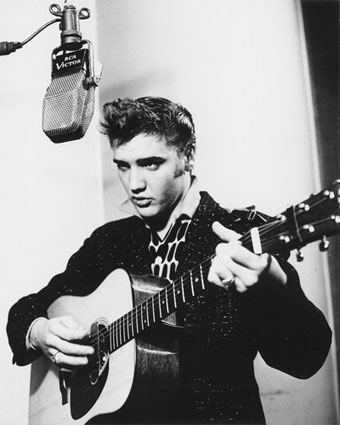 Elvis Presley was an American singer and actor. Regarded as one of the most significant cultural icons of the 20th century, he is often referred to as the “King of Rock and Roll” or simply the “King“.
Elvis Presley was an American singer and actor. Regarded as one of the most significant cultural icons of the 20th century, he is often referred to as the “King of Rock and Roll” or simply the “King“.
Presley was born in Tupelo, Mississippi, and relocated to Memphis, Tennessee, with his family when he was 13 years old. His music career began there in 1954, recording at Sun Records with producer Sam Phillips, who wanted to bring the sound of African-American music to a wider audience. Accompanied by guitarist Scotty Moore and bassist Bill Black, Presley was a pioneer of rockabilly, an uptempo, backbeat-driven fusion of country music and rhythm and blues. In 1955, drummer D. J. Fontana joined to complete the lineup of Presley’s classic quartet and RCA Victor acquired his contract in a deal arranged by Colonel Tom Parker, who would manage him for more than two decades. Presley’s first RCA single, “Heartbreak Hotel”, was released in January 1956 and became a number one hit in the United States. With a series of successful network television appearances and chart-topping records, he became the leading figure of the newly popular sound of rock and roll. His energized interpretations of songs and sexually provocative performance style, combined with a singularly potent mix of influences across color lines during a transformative era in race relations, made him enormously popular—and controversial.
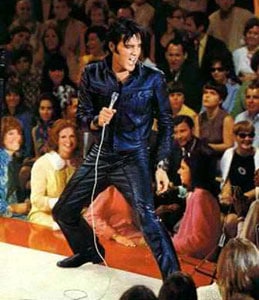 In November 1956, Presley made his film debut in Love Me Tender. Drafted into military service in 1958, Presley relaunched his recording career two years later with some of his most commercially successful work. He held few concerts however, and guided by Parker, proceeded to devote much of the 1960s to making Hollywood films and soundtrack albums, most of them critically derided.
In November 1956, Presley made his film debut in Love Me Tender. Drafted into military service in 1958, Presley relaunched his recording career two years later with some of his most commercially successful work. He held few concerts however, and guided by Parker, proceeded to devote much of the 1960s to making Hollywood films and soundtrack albums, most of them critically derided.
In 1968, following a seven-year break from live performances, he returned to the stage in the acclaimed television comeback special Elvis, which led to an extended Las Vegas concert residency and a string of highly profitable tours. In 1973, Presley gave the first concert by a solo artist to be broadcast around the world, Aloha from Hawaii.
Years of prescription drug abuse severely compromised his health, and he died suddenly in 1977 at his Graceland estate at the age of 42.
Presley is one of the most celebrated and influential musicians of the 20th century. Commercially successful in many genres, including pop, country, blues, and gospel, he is the best-selling solo artist in the history of recorded music. He won three competitive Grammys, received the Grammy Lifetime Achievement Award at age 36, and has been inducted into multiple music halls of fame.
The Everly Brothers

were an American country-influenced rock and roll duo, known for steel-string acoustic guitar playing and close harmony singing. Isaac Donald “Don” Everly (born February 1, 1937) and Phillip “Phil” Everly (January 19, 1939 – January 3, 2014) were inducted to the Rock and Roll Hall of Fame in 1986 and the Country Music Hall of Fame in 2001.
In purely commercial terms, the Everly Brothers were one of the most successful acts in popular music between 1957 and 1962. Only Elvis Presley, Pat Boone, and possibly Rick Nelson outsold them. In a sense, though, they were more important to Nashville. They were the first consistently successful rock & roll act to come from there. Their management and their songs came from Nashville, and they recorded there with local session musicians. In other words, they extended Nashville’s sense of what was commercially possible.
In artistic terms, the Everlys took the country brother duet one step further. They added Bo Diddley riffs, teenage anxieties, and sharkskin suits, but–for all that–the core of their sound remained country brother harmony. That link was underscored on their album Songs Our Daddy Taught Us.
The Everlys’ father, Ike, was an accomplished fingerstyle guitarist, a contemporary of Merle Travis, who went to Chicago trying to sustain a career in country radio, and ended up in the Midwest. He brought his family to Nashville in 1955, possibly hoping that his boys could find the success that had eluded him. Don found some success as a songwriter (“Thou Shalt Not Steal” for Kitty Wells, two songs for Justin Tubb, and another for Anita Carter), but a contract with Columbia Records’ Nashville division in 1955 yielded just one undistinguished single.
By the time the brothers signed with Cadence Records in March 1957 (a deal midwifed by music publisher Wesley Rose of Acuff-Rose), they were singing teenage playlets crafted by songwriters Boudleaux and Felice Bryant overlaid with r&b rhythm patterns. The Everlys scored a string of hits, including “Bye, Bye Love,” “Wake Up, Little Susie,” “All I Have to Do Is Dream,” “Bird Dog,” and others. When they switched to Warner Bros. Records in 1960, they were, at first, even more successful. “Cathy’s Clown,” “Ebony Eyes,” “Walk Right Back,” and “So Sad (To Watch Good Love Go Bad)” were among their hits. Their records were among the most immaculately crafted and innovative of the era, a testimony to the brothers’ musical vision and to the skill of the Nashville session players who proved themselves adept at executing more than they were often given credit for.
The responsibility for the downward slide in their career is usually laid at the door of the Beatles, but the brothers’ appeal was beginning to wane a year or more before the Beatles appeared. They broke with Wesley Rose in 1961, moved to California, and began making singles that were probably too experimental for the time. A slowdown in their touring schedule brought on by a joint enlistment in the Marines, the loss of access to the Bryants’ songs owing to the split with Acuff-Rose, and Don’s subsequent overreliance upon prescription drugs probably figured in their decline, too.
In 1968, they issued Roots, a daring country-rock record that failed to find them a new market. In 1970 they switched to RCA, but they split angrily from each other in July 1973. Don returned to Nashville; Phil stayed in Los Angeles. They reunited in September 1983 for a live concert album released on Mercury Records and resumed touring and recording together. In recent years, the brothers have donated concert proceeds to the philanthropic Everly Brothers Foundation.
Members of the Rock and Roll Hall of Fame, and recipients of a Grammy Award for Lifetime Achievement, the Everlys were elected to the Country Music Hall of Fame in 2001.
Phil Everly died on January 3, 2014 of complications from chronic obstructive pulmonary disease.
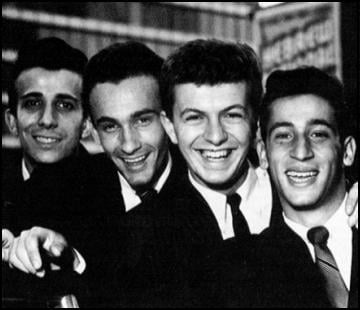 Dion is an American singer and songwriter whose work has incorporated elements of doo-wop, rock and R&B styles—and, most recently, straight blues. Initially as lead singer of Dion and the Belmonts and then in his solo career, he was one of the most popular American rock and roll performers of the pre-British Invasion era. He had 39 Top 40 hits in the late 1950s and early 1960s as a solo performer, with the Belmonts or with the Del Satins. He is best remembered for the singles “Runaround Sue”, “The Wanderer”, “Ruby Baby” and “Lovers Who Wander”, among his other hits.
Dion is an American singer and songwriter whose work has incorporated elements of doo-wop, rock and R&B styles—and, most recently, straight blues. Initially as lead singer of Dion and the Belmonts and then in his solo career, he was one of the most popular American rock and roll performers of the pre-British Invasion era. He had 39 Top 40 hits in the late 1950s and early 1960s as a solo performer, with the Belmonts or with the Del Satins. He is best remembered for the singles “Runaround Sue”, “The Wanderer”, “Ruby Baby” and “Lovers Who Wander”, among his other hits.
Dion’s popularity waned in the mid-1960s. Toward the end of the decade, he shifted his style and produced songs with a more mature, contemplative feeling, such as “Abraham, Martin and John.” He became popular again in the late 1960s and into the mid-1970s, and he has continued making music ever since. Critics who had dismissed his early work, pegging him as merely a teen idol, praised his later work, and noted the influence he has had on other musicians.
Dion was inducted into the Rock & Roll Hall of Fame in 1989.
The Coasters
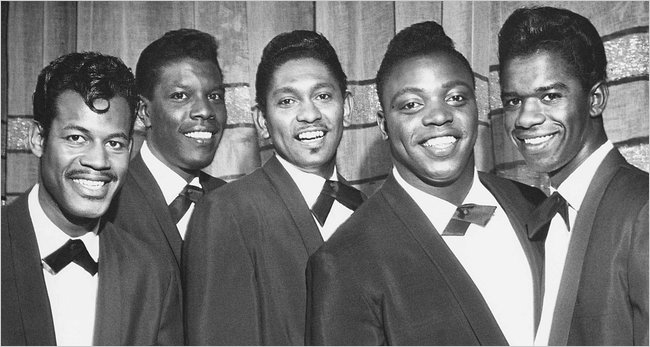
Are an American rhythm and blues/rock and roll vocal group who had a string of hits in the late 1950s. Beginning with “Searchin'” and “Young Blood”, their most memorable songs were written by the songwriting and producing team of Leiber and Stoller. Although the Coasters originated outside of mainstream doo-wop, their records were so frequently imitated that they became an important part of the doo-wop legacy through the 1960s.
The Coasters were formed on October 12 1955 when only two of The Robins were willing to go to Atlantic Records, those two were dubbed The Coasters because they went from West to East coast. The Robins were a Los Angeles–based rhythm-and-blues group that included Carl Gardner and Bobby Nunn. The original Coasters were Gardner, Nunn, Billy Guy, Leon Hughes (who was replaced by Young Jessie on a couple of their early Los Angeles recordings), and the guitarist Adolph Jacobs. Jacobs left the group in 1959.
The songwriting team of Jerry Leiber and Mike Stoller started Spark Records and in 1955 produced “Smokey Joe’s Cafe” for the Robins (their sixth single with Leiber and Stoller). The record was popular enough for Atlantic Records to offer Leiber and Stoller an independent production contract to produce the Robins for Atlantic. Only two of the Robins—Gardner and Nunn—were willing to make the move to Atlantic, recording their first songs in the same studio as the Robins had done (Master Recorders). In late 1957, the group moved to New York and replaced Nunn and Hughes with Cornell Gunter and Will “Dub” Jones. The new quartet was from then on stationed in New York, although all had Los Angeles roots.
The Coasters’ association with Leiber and Stoller was an immediate success. Together they created a string of good-humored “storytelling” hits that are some of the most entertaining from the original era of rock and roll. According to Leiber and Stoller, getting the humor to come through on the records often required more recording “takes” than for a typical musical number.
Their first single, “Down in Mexico”, was an R&B hit in 1956 and appears (in a re-recording from 1973—still with Gardner singing the lead) on the soundtrack of Quentin Tarantino’s Death Proof. The following year, the Coasters crossed over to the pop chart in a big way with the double-sided “Young Blood”/”Searchin'”. “Searchin'” was the group’s first U.S. Top 10 hit and topped the R&B chart for 13 weeks, becoming the biggest R&B single of 1957 (all were recorded in Los Angeles).
“Yakety Yak” (recorded in New York), featuring King Curtis on tenor saxophone, included the famous lineup of Gardner, Guy, Jones, and Gunter, and became the act’s only national number 1 single, topping the R&B chart. The next single, “Charlie Brown”, reached number 2 on both charts. It was followed by “Along Came Jones”, “Poison Ivy” (number 1 for almost two months on the R&B chart), and “Little Egypt (Ying-Yang)”.
Changing popular tastes and changes in the group’s lineup contributed to a lack of hits in the 1960s. During this time, Billy Guy was also working on solo projects; the New York singer Vernon Harrell was brought in to replace him for stage performances. Later members included Earl “Speedo” Carroll (lead of the Cadillacs), Ronnie Bright (the bass voice on Johnny Cymbal’s “Mr. Bass Man”), Jimmy Norman, and guitarist Thomas “Curley” Palmer. The Coasters signed with Columbia Records’ Date label in 1966, reuniting with Leiber and Stoller (who had parted ways with Atlantic Records in 1963), but never regained their former fame. In 1971, the Coasters had a minor chart entry with “Love Potion Number Nine”, a song that Leiber and Stoller had written for the Coasters but instead gave to the Clovers in 1959. In Britain, a 1994 Volkswagen TV advertisement used the group’s “Sorry But I’m Gonna Have To Pass”, which led to a minor chart placement in that country.
In 1987, the Coasters became the first group inducted into the Rock and Roll Hall of Fame, crediting the members of the 1958 configuration. The Coasters also joined the Vocal Group Hall of Fame in 1999.
Several groups used the name in the 1970s, touring throughout the country, though original member Carl Gardner held the legal rights to it. Gardner continued to tour with the Coasters and made many attempts to stop bogus groups with no connection to the original group using the name. In late 2005, Carl’s son Carl Gardner Jr. took over as lead with the group when his father retired. The Coasters’ lineup then consisted of Carl Gardner Jr., J. W. Lance, Primo Candelara, and Eddie Whitfield. Carl Jr. later left this group and has started his own group with Curley Palmer. Carl’s widow Veta owns the rights to the Coasters name.
Leon Hughes is the last surviving member of the original Coasters and performs with his own group. Some of the former members suffered tragic ends. The saxophonist King Curtis (the “fifth Coaster”) was stabbed to death by two junkies outside his apartment building in 1971. Cornelius Gunter was shot to death while sitting in a Las Vegas parking garage in 1990. Nate Wilson, a member of one of Gunter’s offshoot Coasters groups, was shot and his body dismembered in 1980. Former manager Patrick Cavanaugh was convicted of the murder, which took place after Wilson threatened to notify authorities of Cavanaugh’s intent to buy furniture with stolen checks. Cavanaugh was convicted of the murder and given the death sentence in 1984, but his sentence was commuted to life in prison. He died at 60 in 2006, in Ely State Prison, in Nevada.
The Coasters continue to appear regularly on “oldies” shows and PBS specials as old favorites and are available for bookings.
The hits list below is from Joel Whitburn’s Top R&B Singles and from the Pop positions published in Bill Millar’s book The Coasters (1975).
Carl Gardner published his autobiography, Carl Gardner: Yakety Yak I Fought Back: My Life With The Coasters, in 2007.
The Coasters’ recordings produced by Leiber and Stoller for Date/King (1966–1972) were released on the CD Down Home by Varèse Vintage (Varèse Sarabande) in 2007. The complete Atco recordings (1954–1966) were released in a four-CD set, There’s a Riot Goin’ On: The Coasters on Atco, by Rhino, also in 2007.
Jerry Lee Lewis
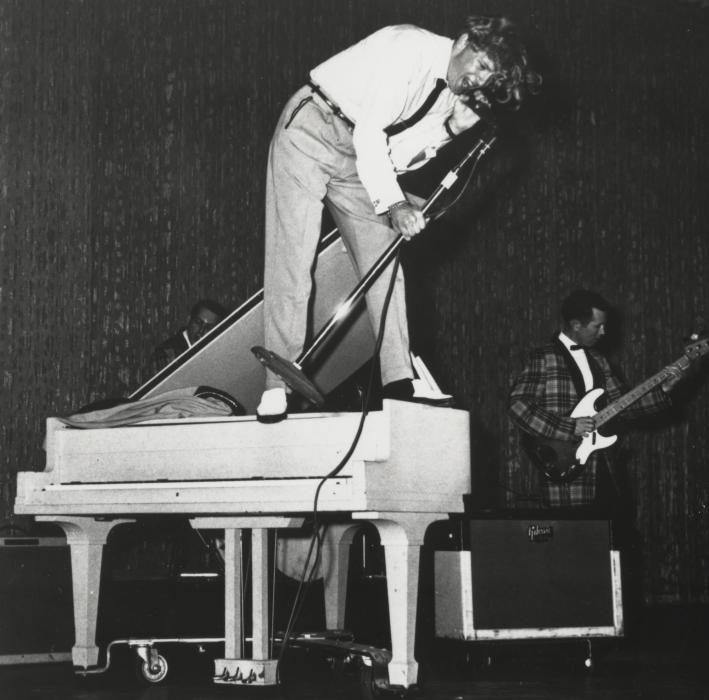
is an American singer-songwriter, musician, and pianist, often known by his nickname, The Killer. He has been described as “rock & roll’s first great wild man.”
A pioneer of rock and roll and rockabilly music, Lewis made his first recordings in 1956 at Sun Records in Memphis. “Crazy Arms” sold 300,000 copies in the South, but it was his 1957 hit “Whole Lotta Shakin’ Goin’ On” that shot Lewis to fame worldwide. He followed this with “Great Balls of Fire”, “Breathless” and “High School Confidential”. However, Lewis’s rock and roll career faltered in the wake of his marriage to his 13-year-old cousin.
He had minimal success in the charts following the scandal, and his popularity quickly eroded. His live performance fees plummeted from $10,000 per night to $250. In the meantime he was determined to gain back some of his popularity. In the early 1960s, he did not have much chart success, with few exceptions, such as a remake of Ray Charles’s “What’d I Say”. His live performances at this time were increasingly wild and energetic. His 1964 live album Live at the Star Club, Hamburg is regarded by music journalists and fans as one of the wildest and greatest live rock albums ever. In 1968, Lewis made a transition into country music and had hits with songs such as “Another Place, Another Time”. This reignited his career, and throughout the late 1960s and 1970s he regularly topped the country-western charts; throughout his seven-decade career, Lewis has had 30 songs reach the top 10 on the “Billboard Country and Western Chart”. His No. 1 country hits included “To Make Love Sweeter for You”, “There Must Be More to Love Than This”, “Would You Take Another Chance on Me”, and “Me and Bobby McGee”.
Lewis’s successes continued throughout the decade and he embraced his rock and roll past with songs such as a cover of the Big Bopper’s “Chantilly Lace” and Mack Vickery’s “Rockin’ My Life Away”. In the 21st century Lewis continues to tour around the world and still releases new albums. His album Last Man Standing is his best selling to date, with over a million copies sold worldwide. This was followed by Mean Old Man, which has received some of the best sales of Lewis’s career.
Lewis has a dozen gold records in both rock and country. He won several Grammy awards, including a Lifetime Achievement Award. Lewis was inducted into the Rock and Roll Hall of Fame in 1986, and his pioneering contribution to the genre has been recognized by the Rockabilly Hall of Fame.
Ricky Nelson
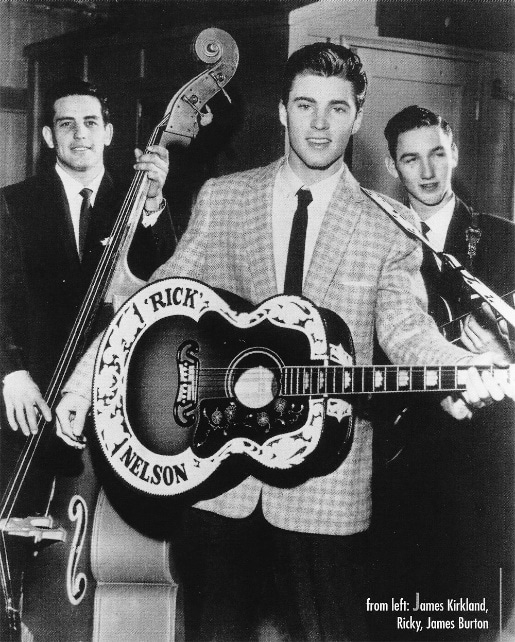
is an American singer-songwriter, musician, and pianist, often known by his nickname, The Killer. He has been described as “rock & roll’s first great wild man.”
A pioneer of rock and roll and rockabilly music, Lewis made his first recordings in 1956 at Sun Records in Memphis. “Crazy Arms” sold 300,000 copies in the South, but it was his 1957 hit “Whole Lotta Shakin’ Goin’ On” that shot Lewis to fame worldwide. He followed this with “Great Balls of Fire”, “Breathless” and “High School Confidential”. However, Lewis’s rock and roll career faltered in the wake of his marriage to his 13-year-old cousin.
He had minimal success in the charts following the scandal, and his popularity quickly eroded. His live performance fees plummeted from $10,000 per night to $250. In the meantime he was determined to gain back some of his popularity. In the early 1960s, he did not have much chart success, with few exceptions, such as a remake of Ray Charles’s “What’d I Say”. His live performances at this time were increasingly wild and energetic. His 1964 live album Live at the Star Club, Hamburg is regarded by music journalists and fans as one of the wildest and greatest live rock albums ever. In 1968, Lewis made a transition into country music and had hits with songs such as “Another Place, Another Time”. This reignited his career, and throughout the late 1960s and 1970s he regularly topped the country-western charts; throughout his seven-decade career, Lewis has had 30 songs reach the top 10 on the “Billboard Country and Western Chart”. His No. 1 country hits included “To Make Love Sweeter for You”, “There Must Be More to Love Than This”, “Would You Take Another Chance on Me”, and “Me and Bobby McGee”.
Lewis’s successes continued throughout the decade and he embraced his rock and roll past with songs such as a cover of the Big Bopper’s “Chantilly Lace” and Mack Vickery’s “Rockin’ My Life Away”. In the 21st century Lewis continues to tour around the world and still releases new albums. His album Last Man Standing is his best selling to date, with over a million copies sold worldwide. This was followed by Mean Old Man, which has received some of the best sales of Lewis’s career.
Lewis has a dozen gold records in both rock and country. He won several Grammy awards, including a Lifetime Achievement Award. Lewis was inducted into the Rock and Roll Hall of Fame in 1986, and his pioneering contribution to the genre has been recognized by the Rockabilly Hall of Fame.
Johnny Cash
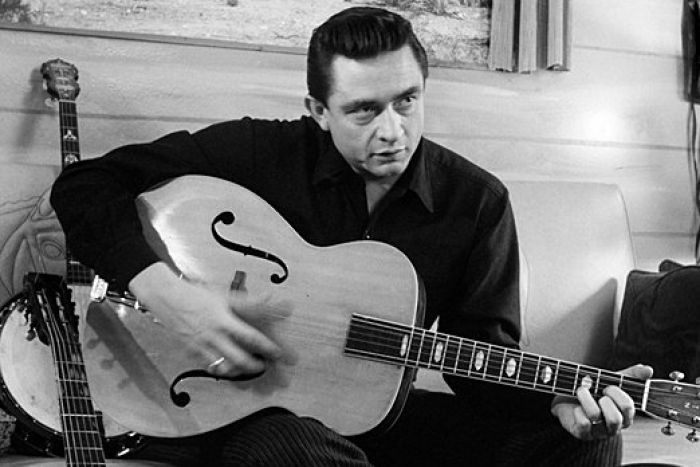
was an American singer-songwriter, guitarist, actor, and author. He is one of the best-selling music artists of all time, having sold more than 90 million records worldwide. Although primarily remembered as a country music icon, his genre-spanning songs and sound embraced rock and roll, rockabilly, blues, folk and gospel. This crossover appeal won Cash the rare honor of being inducted into the Country Music, Rock and Roll, and Gospel Music Halls of Fame.
Cash was known for his deep, calm bass-baritone voice; the distinctive sound of his Tennessee Three backing band, which is characterized by train-sound guitar rhythms; a rebelliousness coupled with an increasingly somber and humble demeanor; free prison concerts; and a trademark, all-black stage wardrobe, which earned him the nickname “The Man in Black.” He traditionally began his concerts by simply introducing himself, “Hello, I’m Johnny Cash,” followed by his signature song “Folsom Prison Blues”.
Much of Cash’s music contained themes of sorrow, moral tribulation, and redemption, especially in the later stages of his career. His other signature songs include “I Walk the Line”, “Ring of Fire”, “Get Rhythm”, and “Man in Black”. He also recorded humorous numbers like “One Piece at a Time” and “A Boy Named Sue”; a duet with his future wife, June Carter, called “Jackson” (followed by many further duets after their wedding); and railroad songs including “Hey, Porter”, “Orange Blossom Special”, and “Rock Island Line”. During the last stage of his career, Cash covered songs by several late 20th-century rock artists, notably “Hurt” by Nine Inch Nails and “Rusty Cage” by Soundgarden.
Drifters
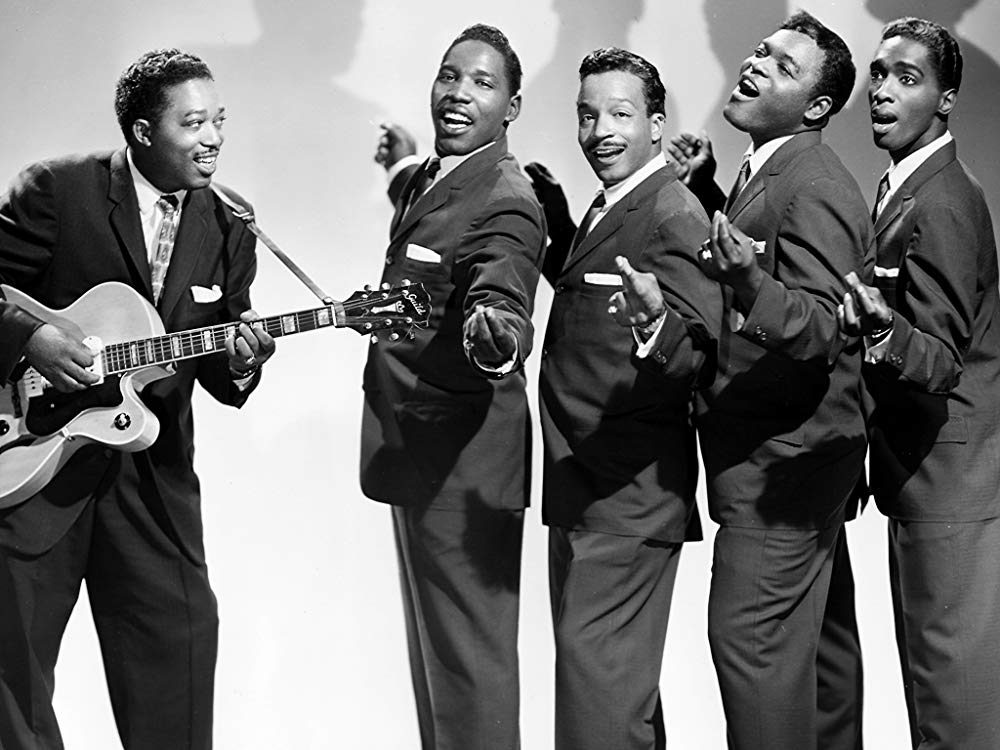
are a long-lasting American doo-wop and R&B/soul vocal group. They were originally formed to serve as a backing group for Clyde McPhatter (of Billy Ward and his Dominoes) in 1953.
According to Rolling Stone magazine, the Drifters were the least stable of the great vocal groups, as they were low-paid musicians hired by George Treadwell, who owned the Drifters name. There have been 60 vocalists in the history of the Treadwell Drifters line, including several splinter groups by former Drifters members (not under Treadwell’s management). These groups are usually identified with a possessive credit such as “Bill Pinkney’s Original Drifters”, “Charlie Thomas’ Drifters”, etc.
There were three golden eras of the Drifters; the early 1950s, the 1960s, and the early 1970s (post-Atlantic period). From these, the first Drifters, formed by Clyde McPhatter, was inducted into the Vocal Group Hall of Fame as “The Drifters”. The second Drifters, featuring Ben E. King, was separately inducted into the Vocal Group Hall of Fame as “Ben E. King and the Drifters”. In their induction, the Rock and Roll Hall of Fame selected four members from the first Drifters, two from the second Drifters, and one from the post-Atlantic Drifters.
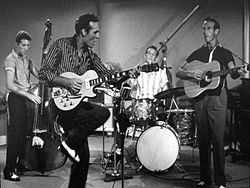 Carl Perkins was an American singer-songwriter who recorded most notably at the Sun Studio, in Memphis, beginning in 1954. His best-known song is “Blue Suede Shoes”.
Carl Perkins was an American singer-songwriter who recorded most notably at the Sun Studio, in Memphis, beginning in 1954. His best-known song is “Blue Suede Shoes”.
According to Charlie Daniels, “Carl Perkins’ songs personified the rockabilly era, and Carl Perkins’ sound personifies the rockabilly sound more so than anybody involved in it, because he never changed.” Perkins’s songs were recorded by artists (and friends) as influential as Elvis Presley, the Beatles, Jimi Hendrix, and Johnny Cash, which further established his place in the history of popular music. Paul McCartney claimed that “if there were no Carl Perkins, there would be no Beatles.”
Called “the King of Rockabilly”, he was inducted into the Rock and Roll Hall of Fame, the Rockabilly Hall of Fame, the Memphis Music Hall of Fame, and the Nashville Songwriters Hall of Fame. He also received a Grammy Hall of Fame Award.
Chet Atkins
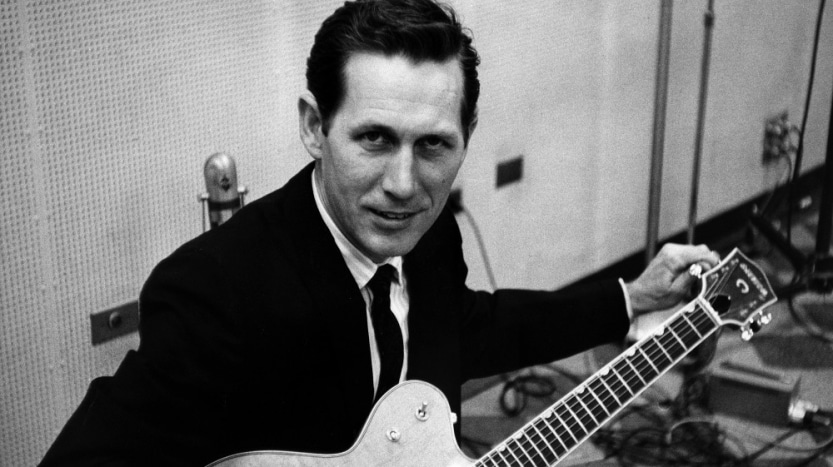
was an American musician, occasional vocalist, songwriter, and record producer, who along with Owen Bradley and Bob Ferguson, among others, created the country music style that came to be known as the Nashville sound, which expanded country music’s appeal to adult pop music fans. He was primarily known as a guitarist. He also played the mandolin, fiddle, banjo, and ukulele.
Atkins’s signature picking style was inspired by Merle Travis. Other major guitar influences were Django Reinhardt, George Barnes, Les Paul, and, later, Jerry Reed. His distinctive picking style and musicianship brought him admirers inside and outside the country scene, both in the United States and abroad. Atkins spent most of his career at RCA Victor and produced records for the Browns, Hank Snow, Porter Wagoner, Norma Jean, Dolly Parton, Dottie West, Perry Como, Floyd Cramer, Elvis Presley, the Everly Brothers, Eddy Arnold, Don Gibson, Jim Reeves, Jerry Reed, Skeeter Davis, Waylon Jennings, and many others.
